
Benelux businesses intensify their sustainability efforts
data-xy-axis-lg:0% 5%; data-xy-axis-md:50% 0%; data-xy-axis-sm:90% 0%
<p><br> September 14, 2023</p>
Benelux businesses intensify their sustainability efforts
<p><b>Our recent study reveals how businesses in the region can shift their focus from low-hanging fruit to how products and services are made and delivered.</b></p>
<p>Among businesses in Belgium, the Netherlands and Luxembourg (Benelux), the focus of sustainability spending has moved well beyond marketing and communications strategies, to creating the digital infrastructure and data platforms needed to meet fast-arriving European regulations and move the needle on ambitious sustainability transformation roadmaps.</p> <p>In particular, the transparency required by the European Union’s Corporate Sustainability Reporting Directive (CSDR) raises to a whole new level the question of what needs to be reported and acted upon to improve environmental and social impacts. Substantial investments to build the required data platforms are helping to fuel the large increase in sustainability spending that we found in our recent survey of 3,000 executives, conducted in partnership with Oxford Economics, including 191 in Benelux.</p> <p>In addition to data reporting requirements, businesses will also need to invest in changing the full value stream, from where raw materials are sourced, to how products are manufactured. Conversations about sustainability are moving beyond the low-hanging fruit of internal operations into the supply chain and how products and services are made and delivered along their entire lifecycle.</p> <p>These upstream and downstream areas are where sustainability impacts—and ambitions—are often highest. Consider the EU Digital Product Passport now in development, which will feature a QR code revealing everything from where the product originated to who was involved in making it, to how it can be recycled.</p> <p>Even beyond compliance, sustainability is very much on the Benelux radar, notably in the Netherlands. As one of the highest density countries in the world, businesses are operating in a culture that’s well aware of the limits of the linear—as opposed to a circular or regenerative—growth model. For example, excessive nitrogen levels in Dutch waterways caused by meat and dairy farming are both an urgent issue and a wakeup call.</p> <p>Recognition is growing of the opportunities inherent to bringing sustainable products and services to market. Here, the challenge lies in substantiating these claims, using high-quality data and product environmental footprints, especially with new EU laws banning misleading green claims.</p> <p>Most companies understand that technology will be essential to accomplishing these goals, and—as seen in our study—are only starting to exploit its full value, such as artificial intelligence/machine learning to get better insights more quickly, intelligent automation to manage vast data volumes, and blockchain to enable supply chain transparency.</p> <p>We’ve developed five recommendations for how Benelux businesses can outperform their markets by embedding sustainability at their core.</p> <h4>#1 Boost sustainability investments to realize full business value</h4>
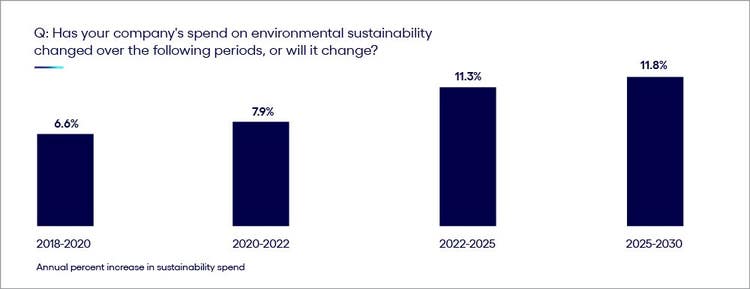
#
<p><span class="small">Source: Cognizant Research<br> Figure 1</span></p> <p>Convinced of the benefits of sustainability transformation, and under growing regulatory pressure, businesses across Benelux have been given the green light to increase investment. Annual average budget growth is expected to increase from 6.6% between 2018 and 2020 to 11.8% between 2025 and 2030.</p> <h4>#2 Elevate your internally focused sustainability initiatives for even greater returns</h4>
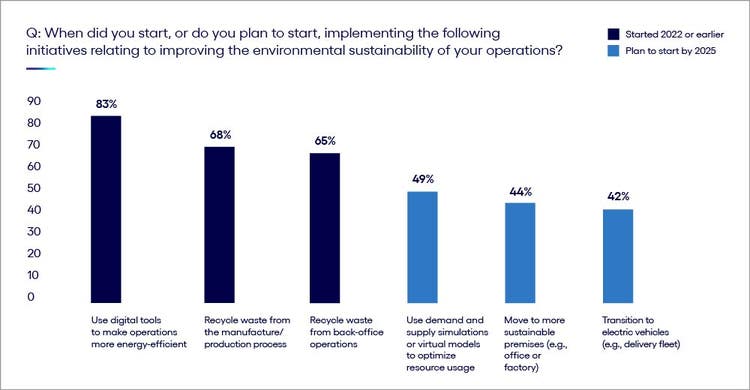
#
<p><span class="small">Source: Cognizant Research<br> Figure 2</span></p> <p>Businesses in Benelux are fully utilizing digital tools to improve the energy efficiency of their internal operations, with more than eight in 10 doing so. Other popular internal initiatives focus on recycling waste, both in manufacturing (68%) and back-office (65%) operations.</p> <p>Looking ahead to 2025, many have plans to make premises, processes and vehicles more sustainable. The top future strategy sees nearly half (49%) planning to use digital twins, reflecting the acknowledged power of digital tools to meet sustainability goals.</p> <h4>#3 Expand your sphere of influence, upstream and downstream, to achieve greater business benefits and impact</h4>
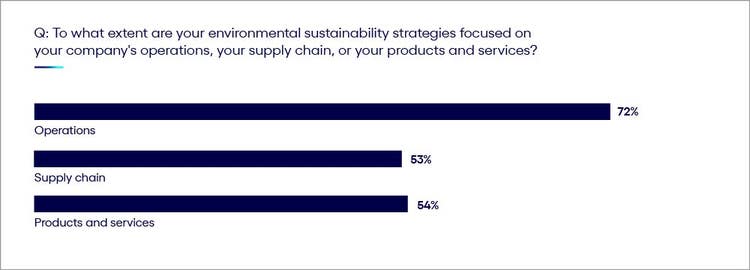
#
<p><span class="small">Source: Cognizant Research<br> Figure 3</span></p> <p>Almost three-quarters (72%) are focusing their sustainability strategy on internal operations vs. just over half on products and services (54%) or supply chain (53%). The emphasis on internal operations is completely justifiable as it stems from the confidence and control businesses can exert in this area.</p> <p>Conversely, it’s more difficult to effect change in areas traditionally out of their own control, such as the complexities of modern supply chains or the afterlife of a product once in the customer’s hands. Businesses can gain greater rewards, however, by using digital technologies to extend their reach to gain visibility and influence across the entire value chain.</p> <h4>#4 Explore new ways to apply and deploy mature and emerging technology</h4>
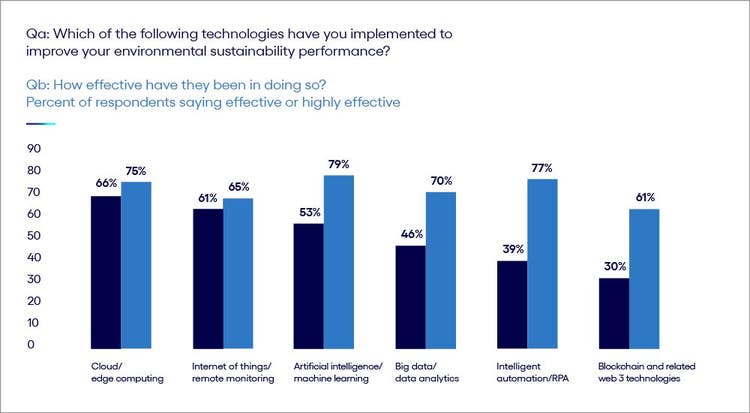
#
<p><span class="small">Source: Cognizant Research<br> Figure 4</span></p> <p>Cloud, IoT and artificial intelligence/machine learning (AI/ML) are the most commonly implemented technologies to support sustainability efforts; however, some less deployed technologies may be more impactful. Although only 39% of businesses in Benelux have applied intelligent automation, for instance, nearly eight in 10 of those that have say it’s effective.</p> <h4>#5 Evolve power structures to allow for necessary shifts in culture and accountability</h4>
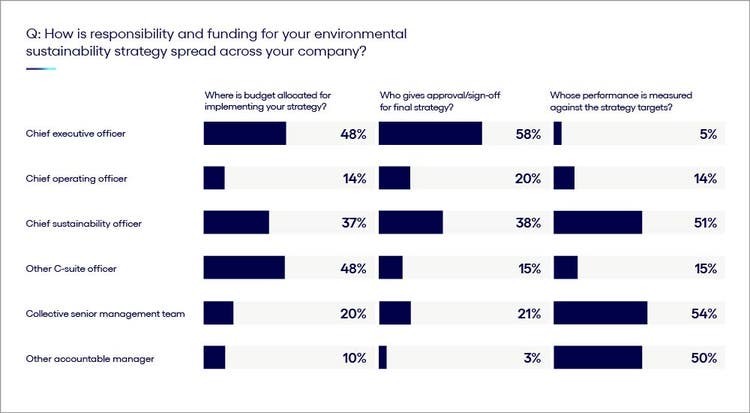
#
<p><span class="small">Source: Cognizant Research<br> Figure 5</span></p> <p>While it’s primarily CEOs in Benelux who allocate the sustainability budget (48%) and approve the strategy (58%), just 5% are accountable or have their performance measured against the strategy’s success. Instead, it’s the chief sustainability officer (CSO) and senior managers who are responsible for outcomes, regardless of their absence at the strategy table.</p> <p>To embed sustainability into the company’s culture, businesses must clarify roles and responsibilities, and clearly connect these to an incentives system to successfully encourage all employees to participate in sustainability endeavors.</p> <p><i>Learn how your business (or you) can become sustainable to the core </i><a href="https://www.cognizant.com/us/en/insights/perspectives/sustainability-in-business-beyond-green-to-deeply-green-wf1518050" target="_blank"><i>in our report</i></a><i> “Deep Green: How data, technology and collaboration will drive the next phase of sustainability in business.”</i></p> <p><i>For even more on this topic, visit our </i><a href="https://www.cognizant.com/us/en/insights/sustainability-resilience" target="_blank"><i>Sustainability & Resilience webpage</i></a><i>.</i></p> <p><i>This article was written by Jan Konietzko, Sustainability Expert and Manager in Cognizant’s Sustainability Practice.</i></p>
<p>We’re here to offer you practical and unique solutions to today’s most pressing technology challenges. Across industries and markets, get inspired today for success tomorrow.</p>
